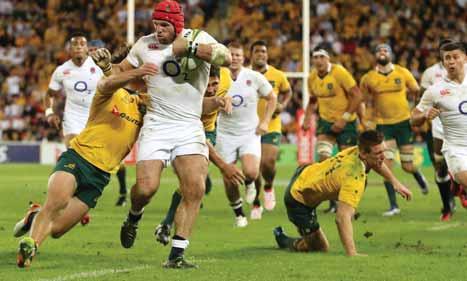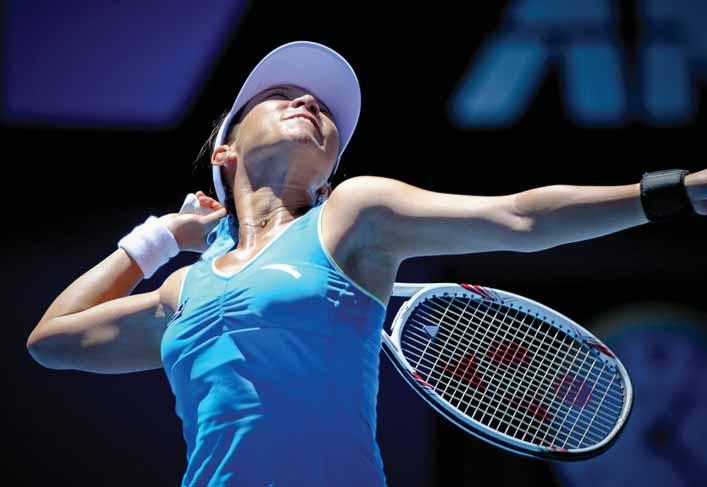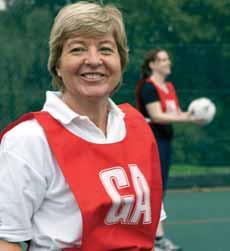
8 minute read
Glory Down Under
No.8 Billy Vunipola was one of the key England players during the Test series.
England completed an historic 3-0 series whitewash over Australia during the summer but Head Coach Eddie Jones believes the best is yet to come for a talented squad which has effected a remarkable turnaround since they crashed out of the 2015 Rugby World Cup at the group stages.
It’s the mark of the ambition of this current England side that even after securing their historic 3-0 series win against Australia with that epic 44-40 victory in Sydney, the immediate talk from the players and management was about the need for all-round improvement in several areas.
During their tour Down Under England moved up to second in the World Rugby Rankings but under coach Eddie Jones the shared objective for the men in white is clear: to become the best team in the world and knock No.1-ranked New Zealand off their throne.
Under Jones, England have certainly effected a major turnaround in fortunes given that eight months previously the team was in disarray having just been eliminated from a home World Cup before the knockout stages after a disastrous performance in their group.
Scroll forward a few months and England –with largely the same squad which took part in the World Cup –are now reigning Six Nations Champions and the first side to inflict a 3-0 home series defeat on the Wallabies since 1971.
In terms of fitness, skills and confidence, the current squad is on a steep upward curve and Jones’ approach has transformed the fortunes of individuals as well as the overallteam.
For an example of a player who has been given a new lease of life under Jones, look no further than James Haskell.
Despite being one of the most experienced players in Stuart Lancaster’s World Cup squad, the Wasps captain was barely afforded any game time during that tournament. Following storming performances in both the 2016 Six Nations and the series against the Wallabies, he is now one of England’s key men and tackled himself to a standstill in the first two tests before injury intervened and reduced him to the role of spectator in the 3rd Test.
Haskell’s style of play seems tailor-made for the game plan that Jones is trying to effect, particularly as part of the rush defence that England have adopted under defence coach Paul Gustard, who first developed the system during his time with Saracens.
Haskell is just one of a whole group of players who are taking their lead from the management to become more effective on the pitch, a culture that is reaping dividends already but could take the team even further.
And there is plenty more to come according to the man in charge.
“You can never take your foot off the pedal,” said Jones after the 3rd Test. “As soon as you take it off you get weak. And we can’t afford to get
weak because we want to be the No.1 team in the world and we are currently miles away from the All Blacks.
“We’ve got to keep improving. We are proud of our efforts –brave, courageous efforts –but we’ve got to get better. There are areas where we are definitely not where we need to be but we can work on that over the next three or four months and make sure the squad we put together is the right squad to beat South Africa in the Autumn internationals.”
The relentless drive to succeed displayed by Jones has clearly rubbed off on his players, many of whom are playing the best rugby of their careers, but the coach believes that the all-round quality of his squad is not yet sufficient to propel the team to the top of the tree.
“We haven’t got five world-class players,” he said. “If you picked a world XV now, we haven’t got them. Players are developing and it takes years to develop a world-class player. Owen Farrell is definitely moving in the right direction, Billy Vunipola is too.
“A couple of other guys have been found out on tour. They did really well in the Six Nations and have been quite poor on tour. That’s a great learning experience for them.
“We’ve got character in oodles at the moment, but it can disappear very quickly. You get one person into the squad that hasn’t got it, that does the wrong things, and it can change the squad.”
Unlike several of his predecessors in the England job, Jones has also displayed a golden touch when it comes to introducing young talent into the squad. All too often in the recent past, players were launched into the international arena when they clearly weren’t ready and then just as swiftly discarded. Maro Itoje, Jack Clifford
England’s Owen Farrell tackles Australia fullback Israel Folau.

and Elliot Daly have come into the squad and have impressed when given their chance.
And with England Under-20 recently winning the World Championship in impressive fashion there is every chance that Jones will be seeking to promote some of those players in the run-up to the next World Cup.
“The guys that really impressed me in the Under-20s will get a place in the EPS squad,” said “I’ve always said there is talent in England and my job is to get that talent to perform consistently. It is a matter of practice and a matter of the environment we create.
“The other thing is the assistant coaches have done a superb job. Paul Gustard, Steve Borthwick, Neal Hatley and Glen Ella have worked really well as a group, and they’ve done a great job in coaching the players. They deserve all the credit, with the players.
“The base was there. If you look at the last four years under Stuart Lancaster, they had spasmodically peak performance. All we’ve tried to do is get consistency: consistency in attitude, consistency in preparation and then you get consistency of performance.”
And England were certainly consistent throughout the three tests as they out-muscled, out-thought and out-scored their hosts.
First up was the opening match in Brisbane where the tourists’ resolve was tested to the extreme in the opening exchangesas the Wallabies opened up their defence to score two tries in the first 15 minutes.
But England refused to panic and fought their way back into the match in impressive fashion, their forward pack turning up the intensity on their Wallaby counterparts to give Owen Farrell the chance to put them back in the game.
Eddie Jones utilised his bench to create maximum impact throughout the three Tests.

Flanker James Haskell emerged as one of the players of the series Down Under.
There were plenty of big moments in this game –not least James Haskell’s seismic hit on Australian No.8 James Pocock in the first half –but it was Farrell’s boot which did the most damage for England, the Saracens man kicking six penalties and two conversions to add to the three tries scored by Marland Yarde, Jonathan Joseph and Jack Nowell.
The final result was a well-deserved 39-28 victory for England as they drew first blood in the series.
A week later in Melbourne, England produced one of the greatest defensive displays ever seen in the international game as Australia threw absolutely everything into all-out attack in order to level the series but found themselves rocked backwards time and time again.
The key passage in the game took place just before half-time when England, leading 10-7, held out for a remarkable 22 phases of Australian attack.
As Australia hammered the line, there was no let-up from the England defence as they smashed

Dylan Hartley holds the Cook Cup aloft as his squad celebrates the series win.
the Wallaby ball-carriers to prevent a score that would have put the home side in front.
Having survived this onslaught, England came out and scored 13 unanswered points in the second half to win by 23-7 and clinch the historymaking series.
Despite this major achievement, England’s celebrations were fairly muted as they stated their intent to complete a whitewash the following week in Sydney.
And so it came to pass as the series finished with a thrilling nine-try encounter that saw attacking moves sweeping from end to end as the lead changed hands several times.
The Wallabies led by a point at half-time following tries from Foley, Dane and Haylett-Penny for the hosts and Dan Cole and Mike Brown for the tourists.
In the second-half, Michael Hooper and Israel struck back for Australia before Billy Vunipola and replacement hooker Jamie George scored for England.
TOUR RESULTS
Saturday, June 11 1st Test (Brisbane) Australia 28 England 39 Australia: Tries: Hooper (2), Folau, Kuridrani. Conversion: Foley. Penalties Foley (2). England: Tries: Joseph, Yarde, Nowell. Conversions: Farrell (2). Penalties: Farrell (6). Attendance: 48,735.
Saturday, June 18 2nd Test (Melbourne) Australia 7 England 23 Australia: Try: Moore. Conversion: Foley. England: Tries: Hartley, Farrell. Conversions: Farrell (2). Penalties: Farrell (3). Attendance: 29,871.
Saturday, June 25 3rd Test (Sydney) Australia 40 England 44 Australia: Tries: Foley, Haylett-Petty, Hooper, Folau, Naiyaravoro. Conversions: Foley (3). Penalties: Foley (3). England: Tries: Cole, Brown, B Vunipola, George. Conversions: Farrell (3). Penalties: Farrell (6). Attendance: 44,063.
The game finished with Naiyaravoro crashing over for the Wallabies but it was too late to save the home side from a 3-0 whitewash, the first time they have suffered such a defeat since South Africa in 1971.
It was a remarkable conclusion to a remarkable England tour Down Under.
• For more news and rugby highlights, visit sister magazine www.clubrugby.org.uk








